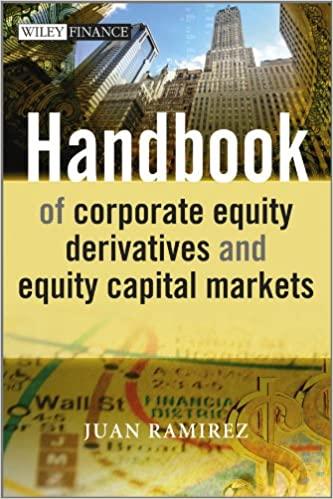Question
1. Consider the two (excess return) index model regression results for Stocks A and B. The risk-free rate over the period was 5%, and the
1. Consider the two (excess return) index model regression results for Stocks A and B. The risk-free rate over the period was 5%, and the markets average return was 12%. The standard deviation of the market return is 13.2%. Performance is measured using an index model regression on excess returns: Ri Rf = + (RM Rf). Stock A Stock B Index model regression estimates RB Rf = 3% + 0.8(RM Rf) RA Rf = 2% + 1.2(RM Rf) R2 0.354 0.846 Residual standard deviation, e 23.4% 8.4% Standard deviation of excess returns 26.9% 20.5% Calculate the following statistics for each stock: a. Alpha b. Information ratio c. Sharpe ratio d. Treynor ratio e. M2 Which stock is the best choice under the following circumstances? f. This is the only risky asset to be held by the investor. (Is this smart?) g. This stock will be mixed with the rest of the investors portfolio, currently composed solely of holdings in the market index fund. h. This is one of many stocks that the investor is analyzing to form an actively managed stock portfolio. 2. A global equity manager is assigned to select stocks from a universe of large stocks throughout the world. The manager will be evaluated by comparing his returns to the return on the MSCI World Market Portfolio, but he is free to hold stocks from various countries in whatever proportions he finds desirable. Results for a given month are contained in the following table: Country Weight in MSCI Index Managers Weight Managers Return in Country Return of Stock Index in Country U.K. 0.15 0.30 25% 14% (FTSE100) Japan 0.30 0.10 20% 18% (TOPIX) U.S. 0.45 0.40 15% 16% (S&P500) Germany 0.10 0.20 5% 12% (DAX)
a. Calculate the total value added of all the managers decisions this period. b. Calculate the value added (or subtracted) by the managers country allocation decisions. c. Calculate the value added from the managers stock selection ability within countries. Confirm that the sum of the contributions to value added from his country allocation plus security selection decisions equals total over- or under-performance.
Step by Step Solution
There are 3 Steps involved in it
Step: 1

Get Instant Access to Expert-Tailored Solutions
See step-by-step solutions with expert insights and AI powered tools for academic success
Step: 2

Step: 3

Ace Your Homework with AI
Get the answers you need in no time with our AI-driven, step-by-step assistance
Get Started


